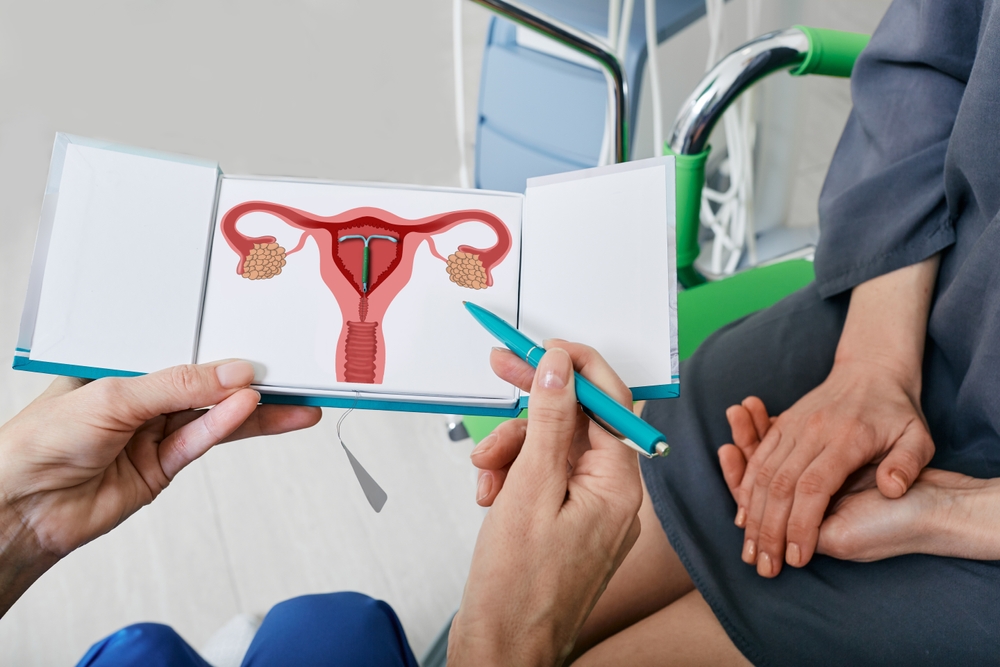The approval of the primary hormonal contraceptive (HC) in 1960 was a historic turning level for ladies, providing unprecedented autonomy over reproductive selections and larger management over the trajectories of their lives. As such, entry to contraception is now recognised as a global human proper (World Well being Organisation, 2014).
An estimated 40% of reproductive-aged girls use hormonal contraceptive (HCs) (Kristensen, 2021), however discontinuation is widespread because of perceived psychological unwanted effects (Martell, 2023). Regardless of this, epidemiological analysis assessing the hyperlink between HCs and temper modifications or melancholy has yielded blended outcomes. Some research report a protecting affect of HCs on temper in particular populations, e.g., these with premenopausal dysphoric dysfunction (PMDD) (Robakis, 2019), whereas different research have reported a unfavourable affiliation or null findings for HCs and depressive signs (Skovlund, 2016; Worly, 2018). These inconsistencies could also be defined by between-study variation; extra analysis is required to grasp this relationship, accounting for nuances relating to the affect of various exogenous hormone formulations and deliveries (e.g., long-acting versus oral strategies), and in several populations.
This weblog entry evaluations findings from a current Danish examine (Larsen et al, 2024) which estimated the danger of melancholy in new customers of three completely different doses of the levonorgestrel-releasing intrauterine system (LNG-IUS). This work is critical not solely to supply knowledgeable counselling to customers but additionally to assist equitable entry to contraception by addressing boundaries associated to concern relating to unwanted effects.

The influences of hormonal contraceptives on psychological well being have been a longstanding concern for ladies of reproductive age. This new potential cohort examine examines melancholy threat in new customers of the levonorgestrel-releasing intrauterine system (LNG-IUS).
Strategies
This was a potential examine utilizing knowledge from the Danish nationwide well being registry. The examine pattern included girls residing in Denmark who:
Had been born in 1978 or later,
Began utilizing an LNG-IUS between the ages of 15 and 44, and
Had no earlier psychological well being dysfunction.
Incident melancholy was decided utilizing diagnostic information or prescription of antidepressants inside 12 months of LNG-IUS insertion. Threat of melancholy was calculated utilizing Cox regression, adjusted for different identified and measured confounders (i.e., age, schooling, household historical past of psychological well being dysfunction, postpartum IUS use and medical issues for which a high-dose IUS is indicated).
Outcomes
The evaluation included 149,200 new customers of the LNG-IUS; 14.8%, 32% and 53.3% of whom used a low, medium and excessive dose gadget, respectively. Excessive-dose IUS customers have been extra prone to be older, to have had kids, and to have been recognized with a medical indication for an LNG-IUS (e.g., heavy menstrual bleeding, dysmenorrhoea, endometriosis or uterine fibroids).
The overall variety of melancholy instances, primarily based on each diagnoses and antidepressant prescriptions, was 2,258. After 12 months, the proportion of low, medium and excessive dose LNG-IUS customers with melancholy was 1.21%, 1.46%, and 1.84%, respectively. This interprets to 0.26% extra of the medium dose group having melancholy in comparison with the low dose group, and 0.63% extra within the excessive in comparison with low dose group; comparatively modest variations in threat.
Circumstances of melancholy have been predominantly recognized by way of antidepressant prescriptions (n=2,110), whereas 366 girls had obtained a proper prognosis. To beat potential bias from together with girls who obtained antidepressants for situations aside from melancholy (e.g., anxiousness issues, power ache situations, premenstrual dysphoric dysfunction [PMDD]), the evaluation was rerun with these for which melancholy was specified because the indication (n=1,198). On this case, absolutely the dangers have been 0.59% (low dose), 0.70% (medium dose), and 1.02% (excessive dose).
The danger variations between low–medium and low–excessive doses have been small; nevertheless, a dose–response sample (i.e., more and more larger threat with a better levonorgestrel dose) was evident whatever the methodology used to establish melancholy instances.
The elevated threat of melancholy within the high- in comparison with the low-dose LNG-IUS group endured following a collection of robustness checks. For instance, the authors carried out separate analyses with the next parameters: nulliparous girls (i.e., with no delivery historical past); girls beneath the age of 30; and people who initiated an LNG-IUS after 2017 (to beat bias from variable prescription patterns over time). Utilizing propensity rating weighting, an evaluation method that goals to imitate randomisation of baseline traits throughout the examine pattern, the authors once more discovered a dose–response relationship between levonorgestrel dose and melancholy threat.
One other evaluation utilizing solely these with a previous psychological well being dysfunction prognosis (48,937 girls) reported dangers for low, medium and excessive dose LNG-IUS to be 4.80%, 5.22% and 5.91%, respectively. On this evaluation, the distinction within the proportion of excessive in comparison with low dose LNG-IUS customers who developed melancholy (1.11%) is bigger than within the group with no prior psychological well being prognosis, suggesting that this group could also be barely extra delicate to the elevated LNG dose.

Twelve months following insertion of an LNG-IUS, a better dose of levonorgestrel was related to a barely larger threat of melancholy; nevertheless, the danger was low total.
Conclusions
The authors concluded that their examine:
gives proof of a dose-dependent affiliation between LNG publicity and threat of subsequent melancholy throughout three dosages, which was constant after contemplating potential confounders, similar to menstrual bleeding indications for high-dose LNG-IUS use.
A spread of further robustness checks have been carried out to beat sources of bias, and this dose-dependent relationship endured whatever the evaluation parameters. Nevertheless, it should be acknowledged that the danger variations (0.27 to 0.66%) have been modest between low and medium to excessive LNG doses, respectively, and that this small elevated threat of melancholy should be thought of alongside different potential helpful results. Clinicians ought to be conscious that larger LNG-IUS doses might marginally enhance the danger of melancholy, however the alternative of LNG dose ought to in the end be holistically knowledgeable, accounting for comorbid situations and affected person preferences.

Greater levonorgestrel dose was linked to a better threat of melancholy in a dose–dependent method. Nevertheless, the general threat distinction between high and low dose LNG-IUS was modest.
Strengths and limitations
Nordic nations are famend for his or her glorious contributions to epidemiological analysis because of their population-based registries that present routinely collected, just about full potential knowledge (Laugesen et al. 2021). This Danish examine is an instance of such, benefitting from a big pattern dimension spanning the extent of the nationwide inhabitants, and consequently, has a excessive degree of statistical energy main to specific estimates and a vastly decreased probability of choice bias. Moreover, such registries have a excessive constructive predictive worth for melancholy (people flagged as having melancholy usually tend to be precisely recognized—there are fewer “false positives”).
The examine additionally did effectively to deal with confounding by gynaecological situations that are sometimes handled with high-dose LNG-IUS, postpartum initiation, and historical past of psychological well being issues. Potential sources of bias have been addressed by way of conducting a collection of sensitivity analyses, every of which maintained a dose-dependent sample for melancholy threat by rising levonorgestrel dose.
Nevertheless, some limitations should be famous. As instructed by Soares (2024) in an editorial response, the exclusion of non-LNG-IUS customers signifies that absolutely the dangers of melancholy should not given in context of the final inhabitants. The annual incidence price of melancholy in Danish girls is roughly 1.3% (Musliner et al. 2019); subsequently, low to medium dose LNG-IUS customers might not incur a meaningfully larger threat than can be anticipated generally. This is a vital consideration when deciphering outcomes.
It’s doable that this examine underestimated the true threat of incident melancholy, as melancholy diagnoses have been taken from the Psychiatric Central Register however have been unavailable for main care. There could also be a subset of sufferers with milder depressive signs who might have obtained counselling targeted on way of life modifications somewhat than medical intervention. Moreover, gentle unfavourable reactions to earlier hormonal contraceptives have been unknown; it’s doable that girls have been switched to LNG-IUS who’ve an present sensitivity to exogenous hormones.
Lastly, whereas variations between the three dosing teams have been adjusted for in analyses, there stays an opportunity that different unknown or unmeasured components might have influenced outcomes.

This examine benefitted from a nationally consultant pattern dimension, and thus, excessive statistical energy and exact estimates. Limitations included the potential for unmeasured confounding and the dearth of knowledge on milder depressive signs.
Implications for apply
Contraceptive counselling shouldn’t be at all times simple. Medical professionals should weigh up the dangers and advantages of a variety of hormonal or non-hormonal choices, all whereas contemplating the distinctive wants of every particular person when it comes to their medical historical past, way of life, earlier contraceptive experiences, and their private preferences. The complicated relationship between hormonal contraceptives and psychological well being shouldn’t be effectively understood, with blended findings for protecting results, elevated dangers or null findings for various contraceptives and melancholy.
Larsen et al. (2024) present novel proof for an rising threat of incident melancholy because the dose of LNG-IUS will increase. Contemplating the dose–response sample and the complementary preclinical proof for the consequences of levonorgestrel on related mechanistic pathways within the central and peripheral nervous techniques, it’s believable that levonorgestrel does modestly enhance melancholy threat. Nevertheless, given the observational nature of this examine, causal relationships can’t be established.
It is usually noteworthy that absolutely the melancholy threat was solely marginally larger than that anticipated within the basic inhabitants. For top-dose LNG-IUS, roughly one in each 152 girls might develop medical melancholy inside 12 months following initiation, in comparison with low dose or the final inhabitants. This might be thought of a small threat total.
On the similar time, it can be crucial for healthcare suppliers to pay attention to this small threat. It has been thought that the LNG-IUS acts solely throughout the intrauterine atmosphere and that it has little affect on widespread physiological processes, for instance, throughout the central nervous system. The dose–dependent sample recognized on this analysis means that exogenous hormones from the LNG-IUS might certainly affect melancholy threat, maybe defined by affect of neuroendocrine pathways, similar to potentiation of hypothalamic-pituitary-adrenal (HPA) axis reactivity (Aleknaviciute et al. 2017). Healthcare suppliers ought to validate affected person’s issues relating to anticipated results of the LNG-IUS on psychological well being outcomes and think about monitoring for signs, particularly in these with a psychiatric historical past or prior sensitivity to different hormonal contraceptives.
Moreover, this examine captured melancholy diagnoses or antidepressant prescriptions, which possible represents girls with extra extreme depressive signs; but it’s doable that girls might expertise milder signs that nonetheless have an effect on their high quality of life. Subsequently, the comparatively small threat of melancholy estimated by this examine shouldn’t be used to dismiss sufferers’ issues. Future analysis is warranted to discover LNG-IUS influences on a wider vary of psychological well being signs and at completely different severities.

The next levonorgestrel dose is related to a barely elevated threat of melancholy; nevertheless, this small threat ought to at all times be weighed up in opposition to different potential advantages of a better LNG-IUS dose (e.g., treating different well being situations).
Assertion of pursuits
I presently supervise a DPhil scholar who’s finding out the affect of postpartum LNG-IUS on breastfeeding charges.
Hyperlinks
Main paper
Larsen SV, Mikkelsen AP, Ozenne B, et al. Affiliation Between Intrauterine System Hormone Dosage and Despair Threat. American Journal of Psychiatry 2024; 181(9) 834–841. https://psychiatryonline.org/doi/full/10.1176/appi.ajp.20230909.
Different references
World Well being Organisation (WHO). Guaranteeing human rights within the provision of contraceptive data and providers: Steerage and proposals. 2014. Geneva Switzerland Division of Reproductive Well being and Analysis.https://iris.who.int/bitstream/deal with/10665/102539/9789241506748_eng.pdf;sequence=1
Kristensen SI, Lidegaard Ø. Hormonal contraceptive use in Denmark 2010-2019. Dan Med J. 2021; 68(6).https://content material.ugeskriftet.dk/websites/default/recordsdata/scientific_article_files/2021-05/a08200599_web.pdf
Martell S, Marini C, Kondas CA et al. Psychological unwanted effects of hormonal contraception: a disconnect between sufferers and suppliers. Contracept Reprod Med. 2023; 8(9). https://doi.org/10.1186/s40834-022-00204-w
Robakis T, Williams KE, Nutkiewicz L. et al. Hormonal Contraceptives and Temper: Assessment of the Literature and Implications for Future Analysis. Curr Psychiatry Rep 2019;21(57). https://doi.org/10.1007/s11920-019-1034-z
Skovlund CW, Mørch LS, Kessing LV, Lidegaard Ø. Affiliation of Hormonal Contraception with Despair. JAMA Psychiatry. 2016;73(11):1154–1162. doi:10.1001/jamapsychiatry.2016.2387
Worly BL, Gur TL, Schaffir J. The connection between progestin hormonal contraception and melancholy: a scientific overview. Contraception. 2018;97(6):478–489.https://www.sciencedirect.com/science/article/pii/S0010782418300325?casa_token=wS982ncxPCUAAAAA:y-UQcrwyQHRkj81OYeLNcHr-B8581rp58G5XERqbb1kWrxwB9_1_MorHaUAxt0As_N7kO4byprA#ab0005
Laugesen Ok, Ludvigsson JF, Schmidt M, et al. Nordic Well being Registry-Primarily based Analysis: A Assessment of Well being Care Methods and Key Registries. Clin Epidemiol. 2021;13:533–554. https://pmc.ncbi.nlm.nih.gov/articles/PMC8302231/#:~:textual content=Thepercent20Nordicpercent20registriespercent20providepercent20population,uppercent20andpercent20exactpercent20censoringpercent20information.
Soares CN. Contraception, Intrauterine Methods, and Despair: Can We Spot the Actual Perpetrator? Am J of Psych. 2024; 181(9):789–92. https://psychiatryonline.org/doi/full/10.1176/appi.ajp.20240647.
Musliner KL, Liu X, Gasse C, et al. Incidence of medically handled melancholy in Denmark amongst people 15–44 years previous: a complete overview primarily based on inhabitants registers. Acta Psychiatr Scand. 2019; 139:548–557. https://pubmed.ncbi.nlm.nih.gov/30908590/
Aleknaviciute J, Tulen JHM, De Rijke YB, et al; The levonorgestrel-releasing intrauterine gadget potentiates stress reactivity. Psychoneuroendocrinology 2017; 80:39–45.https://europepmc.org/article/med/28315609








